Urban-Ag-2022-09
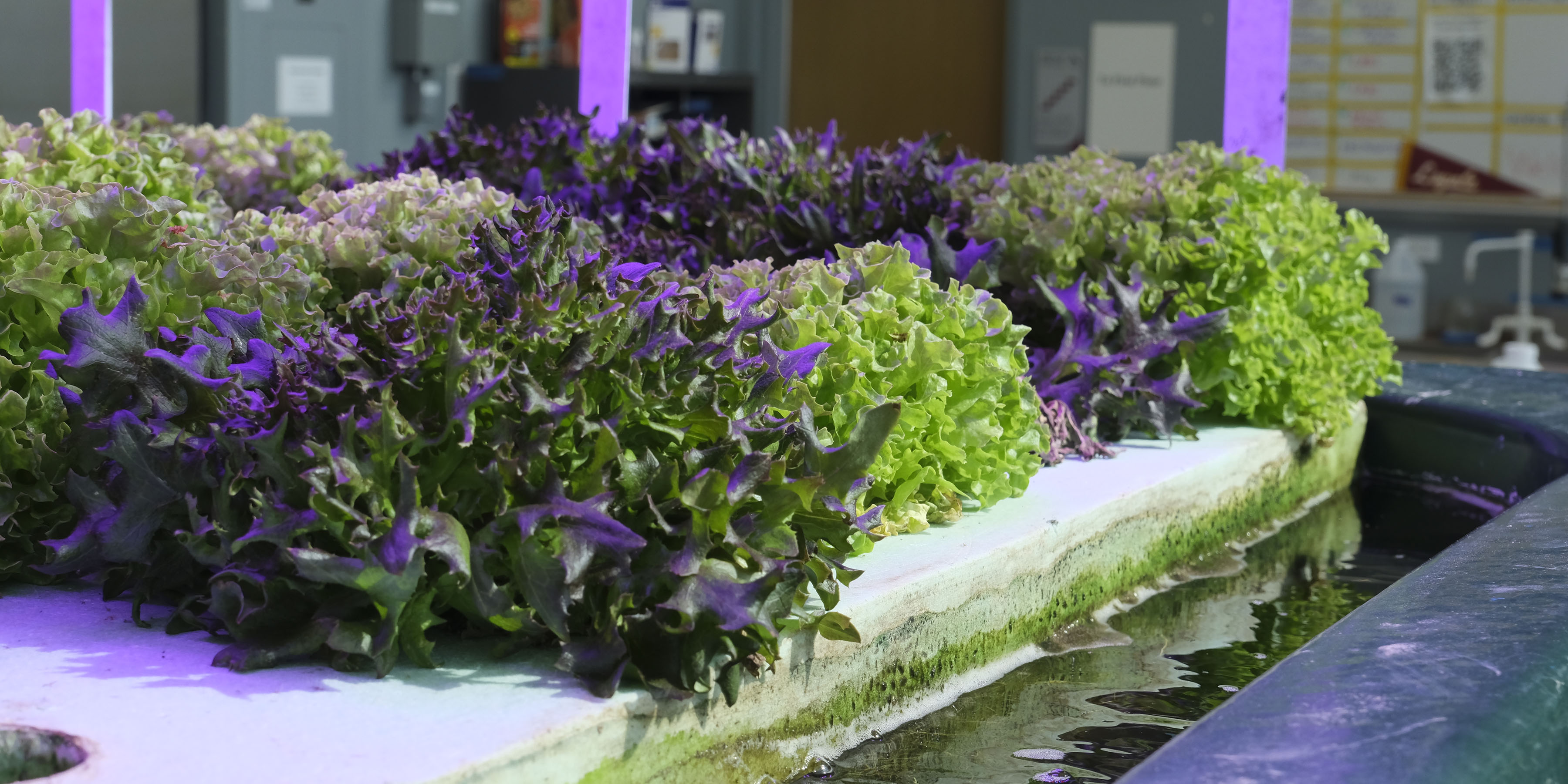
Harvesting Knowledge: Get to Know the Urban Agriculture Student Workers
Story by Alex Quebbeman
Photos by Jorge Haddad and Alex Quebbeman
Loyola University Chicago’s Urban Agriculture Program combines education, hands-on experience, and community engagement with the ultimate goal of empowering students to build more equitable, resilient, and sustainable food systems. The program complements the SES bachelor of science program in food systems sustainable agriculture, and it gives students from all majors opportunities to learn about the fundamentals of food production.
Under the leadership of program manager Kevin Erickson, student workers, interns, and volunteers learn about outdoor farming, hydroponics, aquaponics, farmers markets, and more. As they expand their knowledge, students have opportunities to take on leadership roles as program assistants, managing projects and overseeing student interns and volunteers. Each of the seven students who worked as Urban Agriculture program assistants over the summer shared their experiences and gave insights into the skills and knowledge they gained.
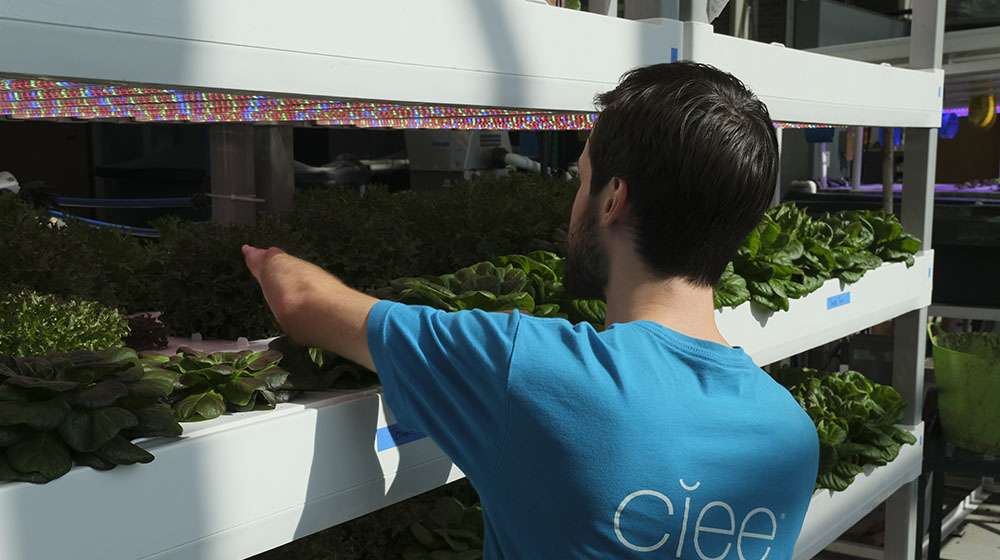
Brandon Horn
Hydroponics program assistant
"My favorite part of the job is being able to come in every day and interact with like-minded people who care about urban agriculture and conservation."
Brandon Horn, a graduate student in the SES master’s degree program, is in charge of hydroponics systems. Hydroponics systems involve growing plants without soil and are a common means of indoor crop production. When he toured Loyola, Brandon was immediately drawn to the greenhouse within the SES building on the Lake Shore Campus.
“Before I came to Loyola, I worked with a different hydroponics company. When I realized the Urban Ag Program had an aquaponics system, I got in contact with Kevin Erickson and asked, ‘hey, is there any way I can work here?’” Brandon said. Coincidentally, there was already talk of starting up a hydroponics system in the greenhouse, so things fell into place.
Brandon’s first project as head of hydroponics was building the whole system. “When I first came in, it was nothing more than a pile of parts. There was no manual or directions. My team of interns and I had to use guesswork and ingenuity to figure out how the pieces fit together,” he said. On top of that, he had to navigate his first significant leadership role. Despite these challenges, the hydroponics system has been much more successful than projected. Brandon initially estimated the lettuce would be ready to harvest 12 weeks after planting, but it has been harvestable in as little as seven weeks.
Aside from learning more about hydroponics and production operations, Brandon’s most meaningful takeaway from Urban Ag is the ability to lead and cooperate with others. “Being able to come in every day and interact with like-minded people who care about urban agriculture and conservation,” Brandon said, is his favorite part of the job.
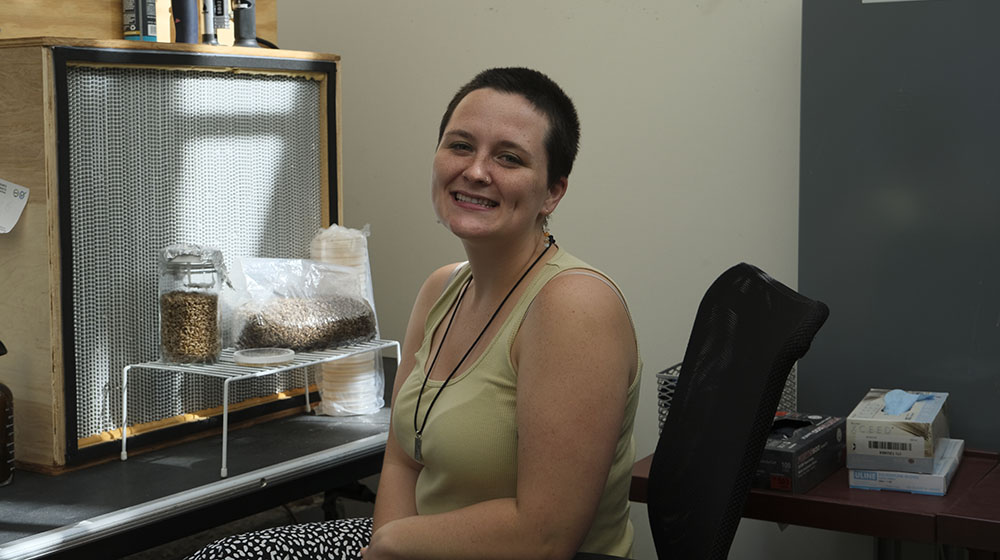
Rachel Joyce
Mushroom production program assistant
“Part of the reason I like environmental science is the hands-on work, whether that’s outdoors or in a lab.”
Rachel Joyce manages Loyola’s mushroom production and is currently a senior majoring in environmental science: food systems and sustainable agriculture. When she transferred to Loyola in the fall of 2020, Rachel learned about agriculture and soil health in a directed readings class, which sparked her interest in the Urban Ag program. As an intern, she was fascinated with mushroom production and wanted to continue building her knowledge as a program assistant.
Rachel now leads a team of interns through the process of mushroom cultivation, from preparing the substrate for the mycelium to grow on to fruiting and harvesting mushrooms. Leading a team of peers through mushroom production has helped Rachel build confidence in delegating tasks and balancing task completion with hands-on enrichment for the interns. “I want to make sure people get what they want from this experience without overworking them,” she said.
Rachel’s favorite part of the Urban Ag Program is the people. “I feel like we have a really strong community of program assistants and interns. I like getting to work with like-minded people who are also passionate about food systems and food justice.”
Team building, leadership, and a deeper understanding of food systems will all serve Rachel in her endeavors. “Part of the reason I like environmental science is the hands-on work, whether that’s outdoors or in a lab,” Rachel said, and she wants that to be a part of her future career.
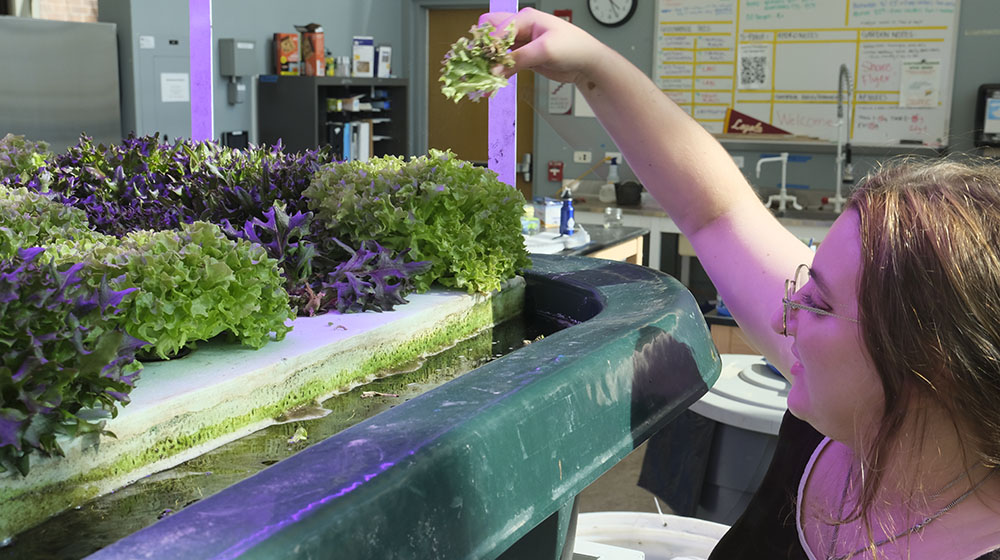
Aurora Belloso
Aquaponics program assistant
“Aquaponics is a really interesting part of agriculture, and it can expand what people can grow in indoor systems.”
Aurora Belloso, a senior majoring in environmental science, manages the aquaponics systems on campus. The systems use Blue Nile tilapia and koi fish, which provide nutrients to grow Salanova lettuce. “Aquaponics is a really interesting part of agriculture, and it can expand what people can grow in indoor systems,” Aurora explained.
In her role, Aurora has learned how to communicate about the intricate aquaponics systems to interns and other SES communities. Talking to others who are also interested in agriculture and environmental justice has been one of her favorite parts of the job. While she teaches other people about aquaponics, she also learns about hydroponics, outdoor gardening, and mushroom production from her peers.
Apart from harvesting lettuce and caring for the fish, Aurora has also taken on various engineering roles. “I’ve done things like replacing pipes, and we’re setting up a new sensor system to record the pH levels and other chemicals in the water, which involves electrical work. I also get to work with data from our old sensor system to visualize changes in the chemical make-up of the water.”
Aurora’s role as a program assistant has given her lots of hands-on opportunities and skills that will be invaluable in her future endeavors in environmental science.
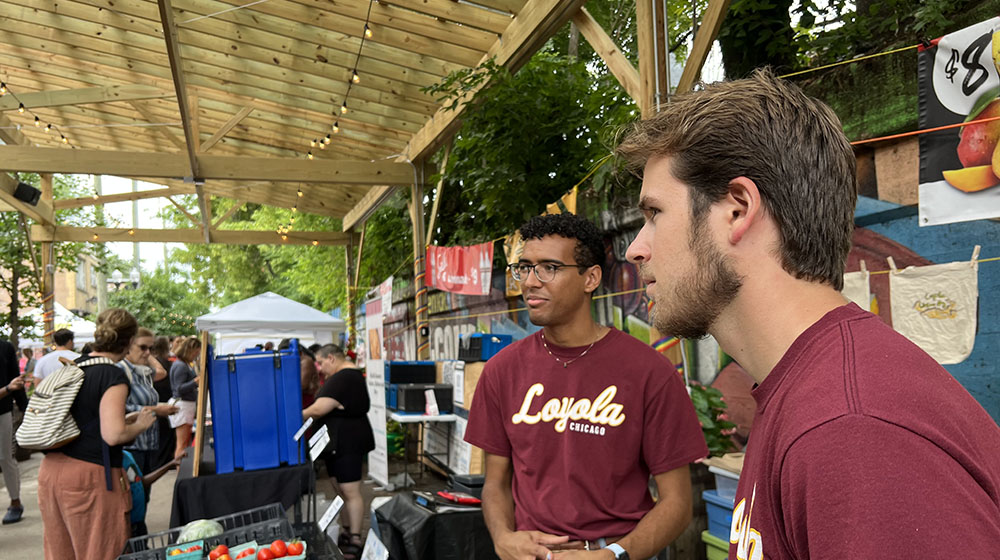
Benji Pesto
Former farmers market program assistant, current Winthrop Garden program assistant
“I really like the Sunday markets. It’s so fun interacting with people and seeing all the interns do the same. There are a lot of recurring customers, so it’s nice building those relationships.”
Benji Pesto, a senior majoring in environmental studies and minoring in German studies, co-managed the farmers market operations in the Urban Ag Program over the summer. Each week, Benji and his team of interns prepared produce, house plants, and hand-painted tote bags for the Glenwood Sunday Market, where they sell the Loyola-produced goods.
After doing an Urban Ag internship last year, Benji’s interest in sustainable urban agriculture solidified. Benji loved his previous experience selling at the farmers market, and he knew it was something he wanted to do again. “I really like the Sunday markets. It’s so fun interacting with people and seeing all the interns do the same,” Benji said. “There are a lot of recurring customers, so it’s nice building those relationships.”
What’s different about his role now is the added responsibility and leadership. “Having to lead people my age, or even people who are older than me, is intimidating,” he admitted. It has been a learning curve, but the leadership skills will be invaluable. On the flip side, this experience has been very bonding for him and the people he works with. Being new to the role, Benji and his co-manager Ty Ferguson spent a lot of time reading the notes of the previous manager. “We were figuring everything out alongside the new interns,” he said. “We were really in it together. This summer, we all got so close. It’s like going to work with my friends.”
At the end of the summer, Benji switched from leading the farmers market team to managing the campus garden to gain experience in growing produce.
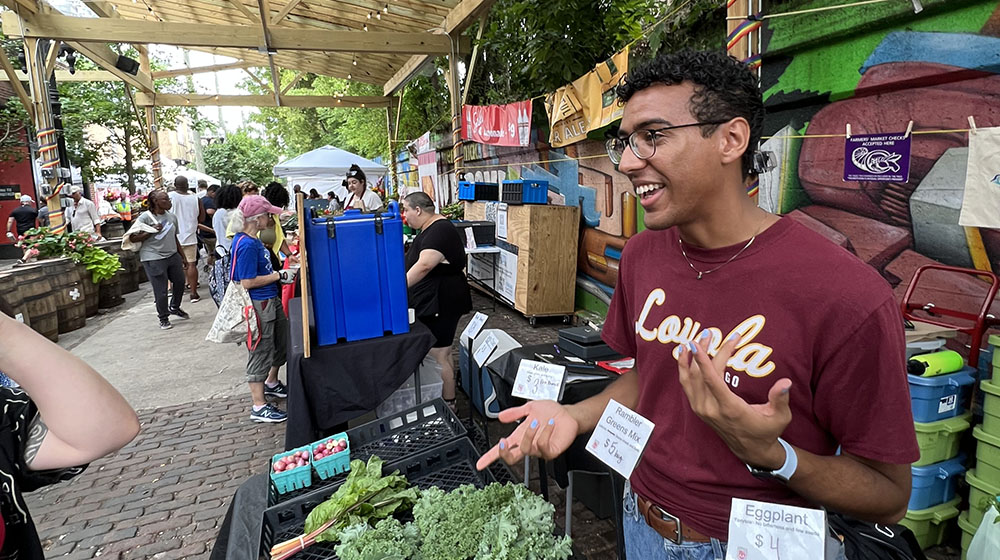
Ty Ferguson
Farmers market program assistant
“Ever since I was 16, I’ve been in the food industry. I think it’s interesting combining what I’ve learned in my college major with my experience in food.”
Ty Ferguson, a senior double majoring in environmental science and environmental studies and minoring in anthropology, co-manages farmers market operations. Ty had been an Urban Ag Program intern last summer and particularly enjoyed working at the farmers market. Hearing a guest speaker talk about her experiences working at markets throughout the Loop area inspired Ty to continue doing this work.
“Ever since I was 16, I’ve been in the food industry,” Ty said. “I think it’s interesting combining what I’ve learned in my college major with my experience in food.”
Apart from preparing the produce and plants for the market, Ty co-manages all the interns’ schedules, transportation, and finances. A difficult thing they have to balance is getting the interns involved and having fun while still completing all the necessary tasks to keep the market running. “Sometimes I want to do engaging stuff with the interns, like repotting a cool plant or dealing with a pest problem, but we have to stop and get started on stuff that we need to sell,” they said. “This is an internship program, and I want them to get more out of it than just retail experience.”
Ty’s favorite part of the job is interacting with people, whether that be the market-goers or the interns. “Talking to people at the market truly goes to show who’s actually living in Rogers Park, which I think is so important because Loyola can be such a microcosm of college life,” he said. “Sometimes you can forget that people were born and raised here. Rogers Park isn’t just Loyola. It’s important to see who’s out there and give what we can back to the community.”
After their experience in the Urban Ag Program, Ty is interested in pursuing farmers market management post-graduation. This position has also opened their eyes to the world of urban agriculture in general and has reaffirmed that this type of work is something they greatly enjoy.
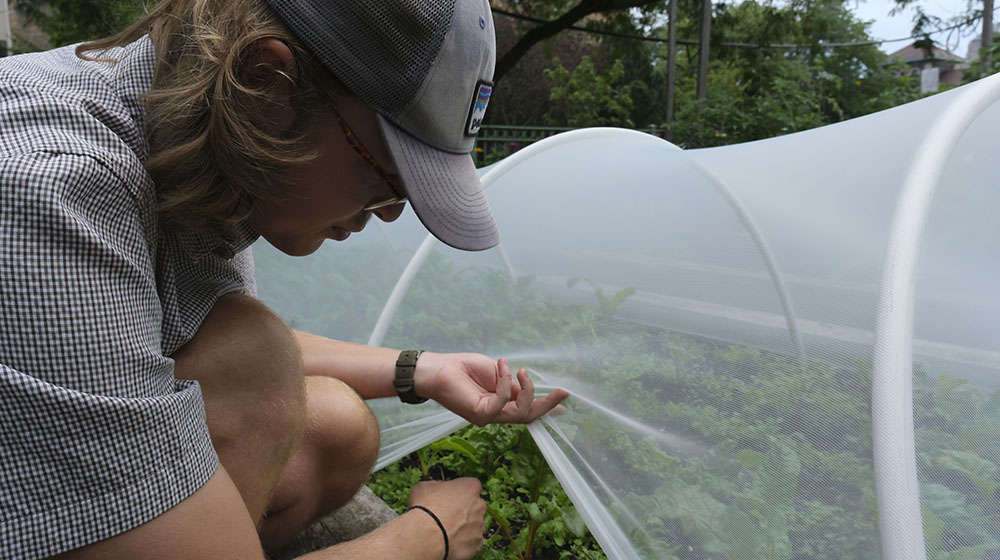
Parker Zerick
Winthrop garden program assistant
“There’s something so refreshing about literally seeing the fruits of our labor in the garden. Growing food and knowing where it came from is really important to me.”
Parker Zerick co-manages the Winthrop Garden. Parker is a senior majoring in environmental science: conservation and restoration and minoring in economics. With experience working on an organic farm and being an Urban Ag intern last spring, he took the opportunity to continue working in agriculture. Parker’s job includes gardening with the most sustainable practices possible, leading the interns, and engaging with the community.
“There’s something so refreshing about literally seeing the fruits of our labor in the garden. Growing food and knowing where it came from is really important to me,” Parker said. Being hands-on is essential to Parker’s job as a program assistant and is also one of the biggest rewards. His job does not come without its challenges, though. From plant identification to figuring out what each plant needs for optimal health, Parker and his team do a lot of problem-solving.
He also had to step into a leadership role this summer. “It’s been an adjustment going from intern to program assistant. I’ve had to plan everything out and lead people. Being in charge of something, and in charge of myself, makes me feel like an adult,” he said, and leading the interns has been rewarding. “I’m teaching them stuff, watching them grow, and engaging with them, and by the end of it, we’re all friends.”
In the future, Parker is interested in pursuing agriculture and potentially agroforestry to restore native tree species.
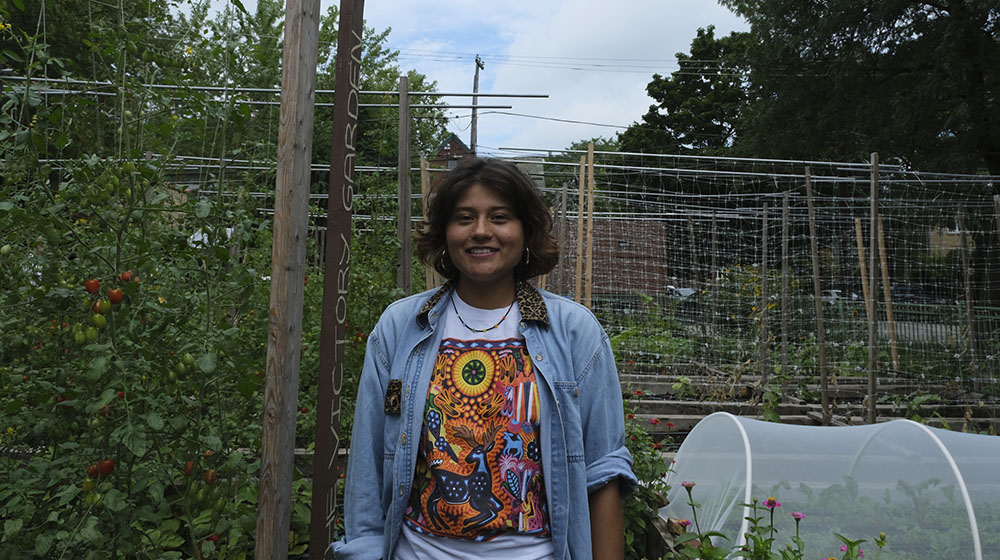
Ericka Gonzalez
Former Winthrop Garden program assistant currently working as a farmers market program assistant
“There’s a lot of indigenous knowledge we need to rescue and bring back. It ties into the organic growing methods we use, and that’s what gives me more motivation and passion for this job.”
Ericka Gonzalez, a senior majoring in environmental science: food systems and sustainable agriculture, co-managed the Winthrop Garden over the summer. On just a tenth of an acre, Ericka and her team members cared for dozens of varieties of fruits, vegetables, and flowers.
“Being in Chicago, we have to take into account the environment that we’re in,” Ericka explained. “We have cold, long winters and hot summers, so we grow different crops for each season.” The garden team also had to do a lot of research on the plants’ growing time, pest control, and organic growing methods.
With all the planning and effort involved in managing a garden, the pressure for success can build up.
“Sometimes I feel like I have everything on my shoulders, but then I remember that I have people here to help me, and I can delegate tasks,” Ericka said. The program is educational at its core, and it fosters a strong sense of community and support. “If we make a mistake, we can fix it and learn from it.”
Ericka’s favorite part of the job has been being outdoors and connecting with nature. “There’s a lot of indigenous knowledge we need to rescue and bring back. It ties into the organic growing methods we use, and that’s what gives me more motivation and passion for this job.” Apart from growing enough produce to sell at the farmer’s market, Ericka and her former co-manager Parker emphasize the importance of native species and pre-colonial ways of growing food in North America.
“I want to reach people and hopefully guide them to learn more about themselves and their capacity to impact the world around them in a positive way,” Ericka said. She also shared a quote from author Octavia E. Butler that inspires her in her work in environmental science and urban agriculture:
“All that you touch, you change,
and all that you change
changes you”
At the end of the summer, Ericka changed roles from managing the garden to a position as a farmer’s market program assistant so she could get experience selling produce and engaging more with the community.
Story by Alex Quebbeman
Photos by Jorge Haddad and Alex Quebbeman
Loyola University Chicago’s Urban Agriculture Program combines education, hands-on experience, and community engagement with the ultimate goal of empowering students to build more equitable, resilient, and sustainable food systems. The program complements the SES bachelor of science program in food systems sustainable agriculture, and it gives students from all majors opportunities to learn about the fundamentals of food production.
Under the leadership of program manager Kevin Erickson, student workers, interns, and volunteers learn about outdoor farming, hydroponics, aquaponics, farmers markets, and more. As they expand their knowledge, students have opportunities to take on leadership roles as program assistants, managing projects and overseeing student interns and volunteers. Each of the seven students who worked as Urban Agriculture program assistants over the summer shared their experiences and gave insights into the skills and knowledge they gained.
Brandon Horn, a graduate student in the SES master’s degree program, is in charge of hydroponics systems. Hydroponics systems involve growing plants without soil and are a common means of indoor crop production. When he toured Loyola, Brandon was immediately drawn to the greenhouse within the SES building on the Lake Shore Campus.
“Before I came to Loyola, I worked with a different hydroponics company. When I realized the Urban Ag Program had an aquaponics system, I got in contact with Kevin Erickson and asked, ‘hey, is there any way I can work here?’” Brandon said. Coincidentally, there was already talk of starting up a hydroponics system in the greenhouse, so things fell into place.
Brandon’s first project as head of hydroponics was building the whole system. “When I first came in, it was nothing more than a pile of parts. There was no manual or directions. My team of interns and I had to use guesswork and ingenuity to figure out how the pieces fit together,” he said. On top of that, he had to navigate his first significant leadership role. Despite these challenges, the hydroponics system has been much more successful than projected. Brandon initially estimated the lettuce would be ready to harvest 12 weeks after planting, but it has been harvestable in as little as seven weeks.
Aside from learning more about hydroponics and production operations, Brandon’s most meaningful takeaway from Urban Ag is the ability to lead and cooperate with others. “Being able to come in every day and interact with like-minded people who care about urban agriculture and conservation,” Brandon said, is his favorite part of the job.
Rachel Joyce manages Loyola’s mushroom production and is currently a senior majoring in environmental science: food systems and sustainable agriculture. When she transferred to Loyola in the fall of 2020, Rachel learned about agriculture and soil health in a directed readings class, which sparked her interest in the Urban Ag program. As an intern, she was fascinated with mushroom production and wanted to continue building her knowledge as a program assistant.
Rachel now leads a team of interns through the process of mushroom cultivation, from preparing the substrate for the mycelium to grow on to fruiting and harvesting mushrooms. Leading a team of peers through mushroom production has helped Rachel build confidence in delegating tasks and balancing task completion with hands-on enrichment for the interns. “I want to make sure people get what they want from this experience without overworking them,” she said.
Rachel’s favorite part of the Urban Ag Program is the people. “I feel like we have a really strong community of program assistants and interns. I like getting to work with like-minded people who are also passionate about food systems and food justice.”
Team building, leadership, and a deeper understanding of food systems will all serve Rachel in her endeavors. “Part of the reason I like environmental science is the hands-on work, whether that’s outdoors or in a lab,” Rachel said, and she wants that to be a part of her future career.
Aurora Belloso, a senior majoring in environmental science, manages the aquaponics systems on campus. The systems use Blue Nile tilapia and koi fish, which provide nutrients to grow Salanova lettuce. “Aquaponics is a really interesting part of agriculture, and it can expand what people can grow in indoor systems,” Aurora explained.
In her role, Aurora has learned how to communicate about the intricate aquaponics systems to interns and other SES communities. Talking to others who are also interested in agriculture and environmental justice has been one of her favorite parts of the job. While she teaches other people about aquaponics, she also learns about hydroponics, outdoor gardening, and mushroom production from her peers.
Apart from harvesting lettuce and caring for the fish, Aurora has also taken on various engineering roles. “I’ve done things like replacing pipes, and we’re setting up a new sensor system to record the pH levels and other chemicals in the water, which involves electrical work. I also get to work with data from our old sensor system to visualize changes in the chemical make-up of the water.”
Aurora’s role as a program assistant has given her lots of hands-on opportunities and skills that will be invaluable in her future endeavors in environmental science.
Benji Pesto, a senior majoring in environmental studies and minoring in German studies, co-managed the farmers market operations in the Urban Ag Program over the summer. Each week, Benji and his team of interns prepared produce, house plants, and hand-painted tote bags for the Glenwood Sunday Market, where they sell the Loyola-produced goods.
After doing an Urban Ag internship last year, Benji’s interest in sustainable urban agriculture solidified. Benji loved his previous experience selling at the farmers market, and he knew it was something he wanted to do again. “I really like the Sunday markets. It’s so fun interacting with people and seeing all the interns do the same,” Benji said. “There are a lot of recurring customers, so it’s nice building those relationships.”
What’s different about his role now is the added responsibility and leadership. “Having to lead people my age, or even people who are older than me, is intimidating,” he admitted. It has been a learning curve, but the leadership skills will be invaluable. On the flip side, this experience has been very bonding for him and the people he works with. Being new to the role, Benji and his co-manager Ty Ferguson spent a lot of time reading the notes of the previous manager. “We were figuring everything out alongside the new interns,” he said. “We were really in it together. This summer, we all got so close. It’s like going to work with my friends.”
At the end of the summer, Benji switched from leading the farmers market team to managing the campus garden to gain experience in growing produce.
Ty Ferguson, a senior double majoring in environmental science and environmental studies and minoring in anthropology, co-manages farmers market operations. Ty had been an Urban Ag Program intern last summer and particularly enjoyed working at the farmers market. Hearing a guest speaker talk about her experiences working at markets throughout the Loop area inspired Ty to continue doing this work.
“Ever since I was 16, I’ve been in the food industry,” Ty said. “I think it’s interesting combining what I’ve learned in my college major with my experience in food.”
Apart from preparing the produce and plants for the market, Ty co-manages all the interns’ schedules, transportation, and finances. A difficult thing they have to balance is getting the interns involved and having fun while still completing all the necessary tasks to keep the market running. “Sometimes I want to do engaging stuff with the interns, like repotting a cool plant or dealing with a pest problem, but we have to stop and get started on stuff that we need to sell,” they said. “This is an internship program, and I want them to get more out of it than just retail experience.”
Ty’s favorite part of the job is interacting with people, whether that be the market-goers or the interns. “Talking to people at the market truly goes to show who’s actually living in Rogers Park, which I think is so important because Loyola can be such a microcosm of college life,” he said. “Sometimes you can forget that people were born and raised here. Rogers Park isn’t just Loyola. It’s important to see who’s out there and give what we can back to the community.”
After their experience in the Urban Ag Program, Ty is interested in pursuing farmers market management post-graduation. This position has also opened their eyes to the world of urban agriculture in general and has reaffirmed that this type of work is something they greatly enjoy.
Parker Zerick co-manages the Winthrop Garden. Parker is a senior majoring in environmental science: conservation and restoration and minoring in economics. With experience working on an organic farm and being an Urban Ag intern last spring, he took the opportunity to continue working in agriculture. Parker’s job includes gardening with the most sustainable practices possible, leading the interns, and engaging with the community.
“There’s something so refreshing about literally seeing the fruits of our labor in the garden. Growing food and knowing where it came from is really important to me,” Parker said. Being hands-on is essential to Parker’s job as a program assistant and is also one of the biggest rewards. His job does not come without its challenges, though. From plant identification to figuring out what each plant needs for optimal health, Parker and his team do a lot of problem-solving.
He also had to step into a leadership role this summer. “It’s been an adjustment going from intern to program assistant. I’ve had to plan everything out and lead people. Being in charge of something, and in charge of myself, makes me feel like an adult,” he said, and leading the interns has been rewarding. “I’m teaching them stuff, watching them grow, and engaging with them, and by the end of it, we’re all friends.”
In the future, Parker is interested in pursuing agriculture and potentially agroforestry to restore native tree species.
Ericka Gonzalez, a senior majoring in environmental science: food systems and sustainable agriculture, co-managed the Winthrop Garden over the summer. On just a tenth of an acre, Ericka and her team members cared for dozens of varieties of fruits, vegetables, and flowers.
“Being in Chicago, we have to take into account the environment that we’re in,” Ericka explained. “We have cold, long winters and hot summers, so we grow different crops for each season.” The garden team also had to do a lot of research on the plants’ growing time, pest control, and organic growing methods.
With all the planning and effort involved in managing a garden, the pressure for success can build up.
“Sometimes I feel like I have everything on my shoulders, but then I remember that I have people here to help me, and I can delegate tasks,” Ericka said. The program is educational at its core, and it fosters a strong sense of community and support. “If we make a mistake, we can fix it and learn from it.”
Ericka’s favorite part of the job has been being outdoors and connecting with nature. “There’s a lot of indigenous knowledge we need to rescue and bring back. It ties into the organic growing methods we use, and that’s what gives me more motivation and passion for this job.” Apart from growing enough produce to sell at the farmer’s market, Ericka and her former co-manager Parker emphasize the importance of native species and pre-colonial ways of growing food in North America.
“I want to reach people and hopefully guide them to learn more about themselves and their capacity to impact the world around them in a positive way,” Ericka said. She also shared a quote from author Octavia E. Butler that inspires her in her work in environmental science and urban agriculture:
“All that you touch, you change,
and all that you change
changes you”
At the end of the summer, Ericka changed roles from managing the garden to a position as a farmer’s market program assistant so she could get experience selling produce and engaging more with the community.
